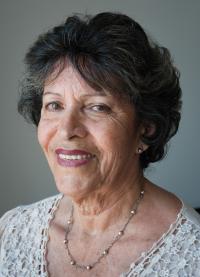“[En] Guanajay ya como estaba yo en mi mundo, porque eran unas personas que afinaban conmigo como personas, como ser humano, afinaban conmigo, porque eran personas como yo, pues enseguida uno hace amistad, se siente uno mejor allí. Lo que pasaba allí, si era una cosa mala, la sufríamos todos, y si era una alegría, nos alegrábamos todos. Una cosa mala es que llegaba por ejemplo una persona de su juicio, y decía: ‘me condenaron a muerte a mi esposo’. Y ya sabe que al otro día ya estaba muerto. Eso era un dolor de todas nosotras. Salía al juicio y venía y decía: ‘me condenaron a muerte a mi papá’. Como sucedió con una muchachita de Isla de Pinos, Irmita Fernández Llorca, que tenía 17 años cuando la cogieron presa. La llevaron a juicio y cuando regresó del juicio dijo: ‘condenaron a muerte a mi papá’. Y ya se sabía que, si lo condenaron a muerte, ya era un hombre muerto. Y aquello era un dolor de todas. Así fueron muchas, muchas mujeres, que salieron a juicio y cuando regresaron, venían con la mala noticia de que tenían… Muchas veces no era familia, era simplemente una amistad, pero es una cosa que uno sufre, porque es una persona que matan miserablemente, por... Es que no sé, ni como calificar la manera con que ellos trataban a esas personas, como ellos podían ser tan malos, tan diabólicos, que no tenían compasión con nadie. No importa si era una persona mayor, si era una persona joven, si era un niño. Ellos llegaron a matar niños, muchachos… Ellos mataron al hermano de una compañera de nosotros, que era inclusive un muchacho anormal, no era normal, y era menor de edad, y lo fusilaron. Fueron muchas, muchos horrores, lo que se pasaron en la prisión. Porque allí todas éramos hermanas. Allí, el dolor de una era el dolor de todas. Y fueron muchas las cosas que se pasaron durante todos esos años en la prisión. Ya cuando pasaron los primeros años, ya pasó toda esa parte mala, ya no caían tantas personas presas, porque al principio fue en masas, cogían a personas en cantidades, fusilaban en cantidades y condenaban en cantidades. Pero ya después pasó un tiempo, digamos años, que ya a nosotros nos llevaron a granjas y eso… Pues no llegaban esas noticias de fusilados y eso, porque ya estábamos condenados todo el mundo, los hombres en prisión, fueron miles y miles y miles de hombres en prisión, a los que llevaron a Isla de Pinos, allí les pusieron trabajos forzados, allí mataban en trabajos forzados. Allí pasó mucho. En Cuba ha pasado tanto, que yo creo que nunca, nunca, nunca, la historia de Cuba va a ser escrita. Nunca se va a saber todas las cosas que el pueblo de Cuba pasó, nunca…, y que los presos políticos pasamos, eso nunca se va a saber.”

